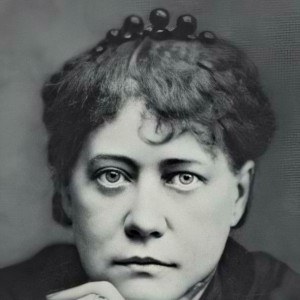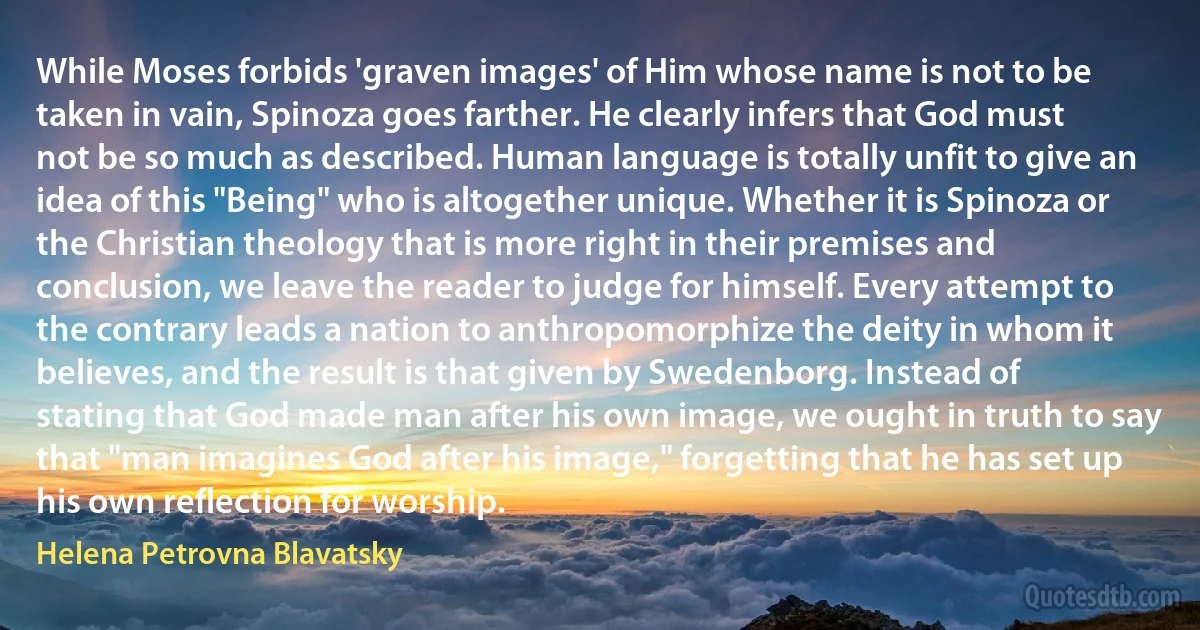Helena Petrovna Blavatsky quotes - page 3
Helena Petrovna Blavatsky was a Russian occultist, philosopher, and co-founder of the Theosophical Society. Her teachings blended Eastern and Western spiritual traditions and inspired modern esoteric thought. She is regarded as a pioneering figure in the development of the modern spiritual movement. Here are 94 of her quotes:
The allegories of the "fall of man" and the "deluge," are the two most important features of the Pentateuch. They are, so to say, the Alpha and Omega, the highest and the lowest keys of the scale of harmony on which resounds the majestic hymns of the creation of mankind; for they discover to him who questions the Zura (figurative Gematria), the process of man's evolution from the highest spiritual entity unto the lowest physical - the post-diluvian man, as in the Egyptian hieroglyphics, every sign of the picture writing which cannot be made to fit within a certain circumscribed geometrical figure may be rejected as only intended by the sacred hierogrammatist for a premeditated blind - so many of the details in the Bible must be treated on the same principle, that portion only being accepted which answers to the numerical methods taught in the Kabala.

Helena Petrovna Blavatsky
According to the ancient doctrines, the soulless elemental spirits were evolved by the ceaseless motion inherent in the astral light. Light is force, and the latter is produced by the will. As this will proceeds from an intelligence which cannot err, for it has nothing of the material organs of human thought in it, being the superfine pure emanation of the highest divinity itself - (Plato's "Father") it proceeds from the beginning of time, according to immutable laws, to evolve the elementary fabric requisite for subsequent generations of what we term human races. All of the latter, whether belonging to this planet or to some other of the myriads in space, have their earthly bodies evolved in the matrix out of the bodies of a certain class of these elemental beings which have passed away in the invisible worlds.

Helena Petrovna Blavatsky
The astral perisprit is contained and confined within the physical body as ether in a bottle, or magnetism in magnetized iron. It is a centre and engine of force, fed from the universal supply of force, and moved by the same general laws which pervade all nature and produce all cosmical phenomena. Its inherent activity causes the incessant physical operations of the animal organism and ultimately results in the destruction of the latter by overuse and its own escape. It is the prisoner, not the voluntary tenant, of the body.

Helena Petrovna Blavatsky
The infinite and uncreated spirit that we usually call GOD, a substance of the highest virtue and excellency, produced everything else by emanative causality. God thus is the primary substance, the rest, the secondary; if the former created matter with a power of moving itself, he, the primary substance, is still the cause of that motion as well as of the matter, and yet we rightly say that it is matter which moves itself. "We may define this kind of spirit we speak of to be a substance indiscernible, that can move itself, that can penetrate, contract, and dilate itself, and can also penetrate, move, and alter matter," which is the third emanation.

Helena Petrovna Blavatsky
And is there no possibility that there was a period, and several periods, when man existed, and yet was not an organic being - therefore could not have left any vestige of himself for exact science? Spirit leaves no skeletons or fossils behind, and yet few are the men on earth who doubt that man can live both objectively and subjectively. At all events, the theology of the Brahmans, hoary with antiquity, and which divides the formative periods of the earth into four ages, and places between each of these a lapse of 1,728,000 years, far more agrees with official science and modern discovery than the absurd chronological notions promulgated by the Councils of Nice and Trent.

Helena Petrovna Blavatsky
What is imagination? Psychologists tell us that it is the plastic or creative power of the soul; but materialists confound it with fancy. The radical difference between the two, was however, so thoroughly indicated by Wordsworth, in the preface to his Lyrical Ballads, that it is no longer excusable to interchange the words. Imagination, Pythagoras maintained to be the remembrance of precedent spiritual, mental, and physical states, while fancy is the disorderly production of the material brain.

Helena Petrovna Blavatsky
There is a phenomenon in nature unknown, and therefore rejected by physiology and psychology in our age of unbelief. This phenomenon is a state of half-death. Virtually, the body is dead; and, in cases of persons in whom matter does not predominate over spirit and wickedness not so great as to destroy spirituality, if left alone, their astral soul will disengage itself by gradual efforts, and, when the last link is broken, it finds itself separated forever from its earthly body. Equal magnetic polarity will violently repulse the ethereal man from the decaying organic mass. The whole difficulty lies in that 1, the ultimate moment of separation between the two is believed to be that when the body is declared dead by science; and 2, a prevailing unbelief in the existence of either soul or spirit in man, by the same science.

Helena Petrovna Blavatsky
The kabalists say that a man is not dead when his body is entombed. Death is never sudden; for, according to Hermes, nothing goes in nature by violent transitions. Everything is gradual, and as it required a long and gradual development to produce the living human being, so time is required to completely withdraw vitality from the carcass. "Death can no more be an absolute end, than birth a real beginning. Birth proves the preexistence of the being, as death proves immortality," says the same French kabalist.

Helena Petrovna Blavatsky
The Gnostics were the earliest Christians with anything like a regular theological system, and it is only too evident that it was Jesus who was made to fit their theology as Christos, and not their theology that was developed out of his sayings and doings. Their ancestors had maintained, before the Christian era, that the Great Serpent - Jupiter, the Dragon of Life, the Father and "Good Divinity," had glided into the couch of Semele, and now, the post-Christian Gnostics, with a very trifling change, applied the same fable to the man Jesus, and asserted that the same "Good Divinity," Saturn (Ilda-Baoth), had, in the shape of the Dragon of Life, glided over the cradle of the infant Mary.

Helena Petrovna Blavatsky
What proofs other than negative have we that the animal is without a surviving, if not immortal, soul? On strictly scientific grounds we can adduce as many arguments pro as contra. To express it clearer, neither man nor animal can offer either proof or disproof of the survival of their souls after death. And from the point of view of scientific experience, it is impossible to bring that which has no objective existence under the cognizance of any exact law of science.

Helena Petrovna Blavatsky
Man is not dead when he is cold, stiff, pulseless, breathless, and even showing signs of decomposition; he is not dead when buried, nor afterward, until a certain point is reached. That point is, when the vital organs have become so decomposed, that if reanimated, they could not perform their customary functions; when the mainspring and cogs of the machine, so to speak, are so eaten away by rust, that they would snap upon the turning of the key. Until that point is reached, the astral body may be caused, without miracle, to reenter its former tabernacle, either by an effort of its own will, or under the resistless impulse of the will of one who knows the potencies of nature and how to direct them. The spark is not extinguished, but only latent - latent as the fire in the flint, or the heat in the cold iron.

Helena Petrovna Blavatsky
In the Book of Hermes, "Pimander," is enunciated in distinct and unequivocal sentences, the whole trinitarian dogma accepted by the Christians. "The light is me," says Pimander, the DIVINE THOUGHT. "I am the nous or intelligence, and I am thy god, and I am far older than the human principle which escapes from the shadow. I am the germ of thought, the resplendent WORD, the SON of GOD. Think that what thus sees and hears in thee, is the Verbum of the Master, it is the Thought, which is God the Father... The celestial ocean, the AETHER, which flows from east to west, is the Breath of the Father, the life-giving Principle, the HOLY GHOST!"

Helena Petrovna Blavatsky
In the "fall of Adam" we must see, not the personal transgression of man, but simply the law of the dual evolution. Adam, or "Man," begins his career of existences by dwelling in the garden of Eden, "dressed in the celestial garment, which is a garment of heavenly light" (Sohar, ii., 229 b); but when expelled he is "clothed" by God, or the eternal law of Evolution or necessarianism, with coats of skin. But even on this earth of material degradation - in which the divine spark (Soul, a corruscation of the Spirit) was to begin its physical progression in a series of imprisonments from a stone up to a man's body - if he but exercise his WILL and call his deity to his help, man can transcend the powers of the angel. "Know ye not that we shall judge angels?" asks Paul (1 Corinthians, vi. 3). The real man is the Soul (Spirit), teaches the Sohar. "The mystery of the earthly man is after the mystery of the heavenly man... the wise can read the mysteries in the human face"

Helena Petrovna Blavatsky
Helena Petrovna Blavatsky
 Occupation: Russian Author
Occupation: Russian Author
Born: August 12, 1831
Died: April 26, 1891
Quotes count: 94
Wikipedia: Helena Petrovna Blavatsky













